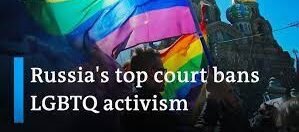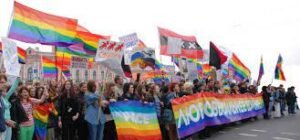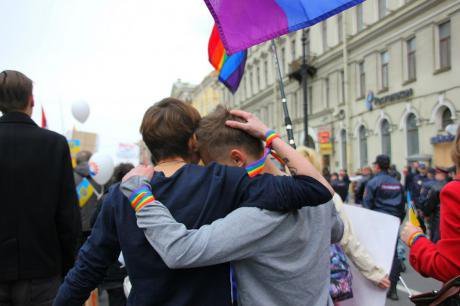
In a seismic maneuver that sends shockwaves through the corridors of human rights dialogue, Russia’s Supreme Court has unequivocally labeled the ‘International LGBT Movement’ as extremist. This clandestine decision, shrouded in the secrecy of closed doors, unfurls a convoluted legal narrative, ushering forth profound implications for LGBTQ+ rights, freedom of expression, and the broader human rights topography in Russia.
Deciphering the Russian Legal Landscape
The labyrinthine nuances of the Supreme Court’s proclamation to brand the ‘International LGBT Movement’ as extremist necessitate scrupulous examination. Behind the opaque confines of the courtroom, judges engaged in a deliberative process that not only classifies the movement as extremist but also sanctions the compilation of a nationwide “list of extremists,” potentially ensnaring individuals affiliated with the cause.
Immediate Repercussions
The immediacy of this edict raises a litany of concerns, particularly for the LGBTQ+ community in Russia. The nationwide proscription of activities associated with the ‘International LGBT Movement’ transcends mere legal decree; it constitutes a paradigm-shifting moment with the potential to reshape the social and cultural fabric of the country. The freedom of expression and assembly for LGBTQ+ individuals and their allies now teeters on the precipice.
International Resonance
As the news reverberates beyond the confines of Russia, the global community reacts with a mixture of astonishment and censure. Human rights organizations, notably Amnesty International, have sounded an urgent alarm over the potential catastrophic consequences for the LGBTQ+ community in Russia. This development thrusts questions regarding Russia’s dedication to upholding global human rights standards to the forefront.
Apprehensions for LGBTQ+ Rights

The crux of the matter lies in apprehensions for LGBTQ+ rights within the Russian Federation. The ruling has engendered fears of heightened discrimination, harassment, and persecution against the LGBTQ+ community. In a nation subjected to criticism for its stance on LGBTQ+ rights, this pronouncement casts an ominous shadow over the community’s quest for equality and acceptance.
Assault on Freedom of Expression
Beyond its repercussions on LGBTQ+ rights, the Supreme Court’s pronouncement raises broader questions about freedom of expression in Russia. Critics posit that stifling the ‘International LGBT Movement’ suppresses dissent and truncates the ability of individuals to openly advocate for LGBTQ+ rights. The right to express one’s identity and beliefs is now ensnared in the crossfire of legal determinations.
The Shroud of Secrecy
The clandestine nature of the decision-making process adds an additional layer of intricacy to an already contentious issue. The lack of transparency begets valid questions about the impartiality of legal proceedings and the potential for undue influence. As the public grapples with the implications, there is a burgeoning demand for lucidity on the rationale behind such a momentous decision.
Potential Ramifications for Individuals
Legal pundits and human rights proponents express trepidation over potential ramifications for individuals affiliated with the ‘International LGBT Movement.’ The specter of being branded as extremists and subjected to targeted scrutiny by authorities looms large. This edict could cast a chilling pall over activism and advocacy for LGBTQ+ rights, compelling individuals into the shadows for fear of reprisal.
International Scrutiny of Human Rights Standards
Russia’s adherence to international human rights standards now faces intense scrutiny. The Supreme Court’s branding of the ‘International LGBT Movement’ as extremist beckons a critical appraisal of the nation’s commitment to safeguarding the rights of all individuals, regardless of their sexual orientation or gender identity. The global community watches attentively, opining on the implications for international human rights norms.
Amnesty International’s Vocal Opposition
Amnesty International, a stalwart defender of human rights, promptly condemned the ruling. In a statement, the organization underscores the potentially catastrophic consequences for the LGBTQ+ community in Russia. The call for international pressure to ensure the protection of human rights within the country amplifies as civil society organizations rally against what they perceive as a grave encroachment on fundamental freedoms.
Impact on Domestic LGBTQ+ Advocacy
Within Russia, LGBTQ+ advocacy groups now navigate precarious terrain. The prohibition on the ‘International LGBT Movement’ constrains their ability to collaborate with international entities and receive support. The stifling of advocacy endeavors on a global scale threatens to isolate the LGBTQ+ community within Russia, rendering the pursuit of rights and recognition even more arduous.
Global Appeals for Reevaluation
The global community, encompassing LGBTQ+ rights advocates and governments, implores Russia to reassess its stance on the ‘International LGBT Movement.’ Beyond mere condemnation, there exists a collective plea for a more inclusive and tolerant approach that respects the rights of all individuals, irrespective of their sexual orientation or gender identity. The aspiration is for a reconsideration that acknowledges the significance of diversity within society.
Conclusion

The proclamation by Russia‘s Supreme Court, designating the ‘International LGBT Movement’ as extremist, unveils a multifaceted narrative with far-reaching implications. Beyond the intricate legal nuances, this pronouncement poses a significant threat to LGBTQ+ rights, freedom of expression, and the broader human rights panorama in Russia. As the world grapples with the repercussions, the LGBTQ+ community and its allies confront a pivotal moment in the ongoing struggle for equality and acceptance.










